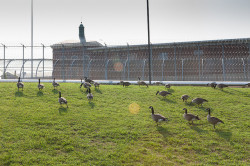Yesterday, we held the Program’s summer “registration fair.” I was joined by Rachel Donaldson and two new instructors, Mark Lindley and Henry Schwarz, along with almost one hundred and fifty incarcerated men who were potential students.
Registration is something that we started doing this Spring, in efforts to institutionalize the course selection/assignment process a bit more. In the past, assigning students to classes had been a bit of an ad hoc process, which was basically workable when there were only a couple/few faculty and enough students for one class. But as both our faculty and student numbers have swelled, it was getting awkward.
What we’ve started doing is working with JCI (and the hard-working librarian and her clerk, as well as their volunteer activities coordinator) to get as many eligible students as possible into classrooms one afternoon before we start the next round of courses. On our side, we get as many faculty as can make it in, to “pitch” their courses. We usually have three rooms of students, and faculty members cycle from room to room explaining what they’ll be teaching and answering questions. Then, potential students can list their top three choices for classes, in rank-order.
The actual assignment process is essentially based on seniority with our program – this avoids any judgment calls, and especially any ire directed at the incarcerated men who help us run the program, from students who didn’t get into a popular course. We say we can guarantee everyone one class (and we’ve been able to make good on that promise so far), and we just go back to the top of the seniority list for multiple courses. I’ll take it as a compliment that two of the most common questions asked were variants on “how can I get into more than one class?” and “I didn’t have a chance to take class X last time, will the professor be teaching it again?”
The actual event always seems more chaotic than it is. We crossed to the school building under a wide expanse of blue sky and found ourselves in the middle of a throng, but several of our long-time students were hard at work manning a check-in table and ensuring that everyone was in the right rooms for count-outs. We had one room that Mr. Greco had smartly filled half with our longest-term students and half with guys completely new to the program, and he and I started there giving a bit of a run-down of how the classes work; then, I pitched my class and a few classes of instructors who couldn’t make it to the event. Meanwhile, apparently Rachel was proving a hard act to follow in the big classroom…
By the end of the afternoon, I was hoarse from shouting over the fans (a necessity when it gets warm – teaching in JCI has impressed on me the value of small group work so folks can be closer than shouting distance, but I sometimes end up doing my best impression of the people’s mic when responding to questions), sweaty, but excited about the new semester we’re heading into.
I’ll be updating the pages on this site to reflect our transition to summer classes over the next few days, and adding information about our new instructors. And, if you’ve made it this far, I feel like I should mention – the beginning of a new semester means a bunch of us will be shelling out for stacks of books. If you are already a supporter, thank you, thank you so much. If you’re not, please consider giving a one-time donation via our support page, or making a monthly contribution via our Patreon campaign.
